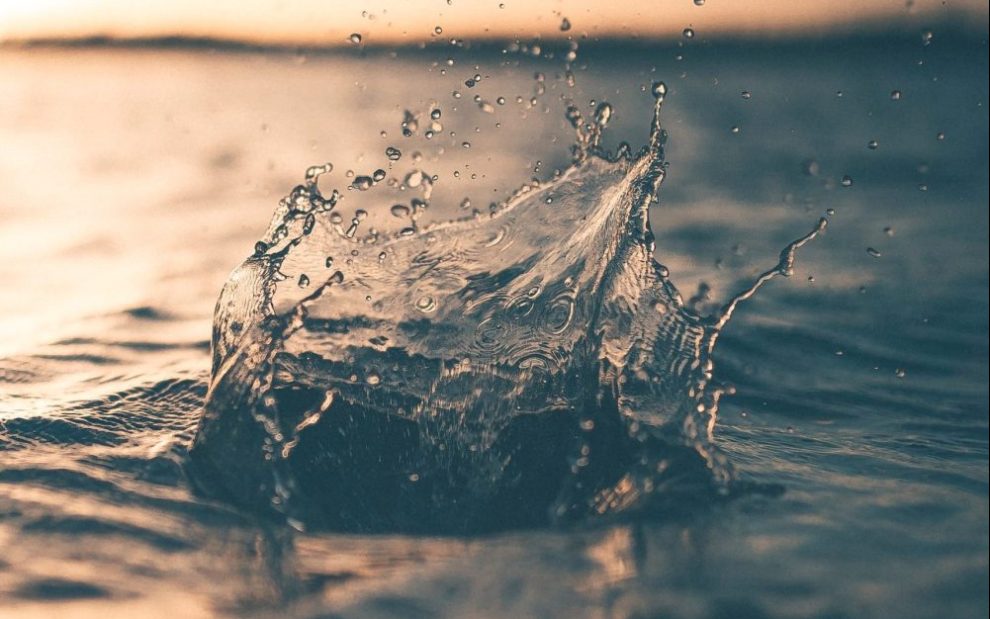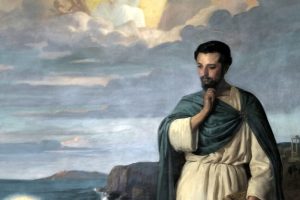The associations many Catholics have with baptism are warm, familial ones. Parents, grandparents, and new godparents gather around with other relatives, friends, and members of a parish community to welcome a tiny addition into the family of faith.
However, as the priest or deacon recites prayers invoking various appearances of water in scripture—including the great flood and the parting of the Red Sea—it might not occur to most people that another rather jarring image appropriate for this celebration is the act of near drowning.
But it’s a layer of symbolism in keeping with the theological meaning of the first sacrament of initiation, says Jana Bennett, professor of religious studies at the University of Dayton. She cites the practice of full immersion baptism, with the newly baptized being raised from the waters.
“They’re kind of gasping for breath,” Bennett says, likening it to a person who cheats death saying, “I’m going to change my life and go out and do these things. . . . I am alive, and I’m invited into this adventure.”
While this image is common at Easter vigils, it still isn’t the norm for experiences of baptism. In 2022, the church reported baptizing 437,942 infants and 26,272 adults in the United States, down from 772,155 infants and 44,623 adults a decade earlier. With the overwhelming majority of Catholics receiving their baptism as infants, the sacrament is literally forgotten by many people, despite being “indelible”—something that stays with a person forever, like the memory of a near-drowning.
“When we are baptized [as infants], we don’t hear these words,” says Carolyn Woo, a Catholic laywoman who has served in leadership positions that include president and chief executive officer of Catholic Relief Services and dean of Notre Dame’s Mendoza College of Business. “That whole baptismal call is a journey of different chapters,” she adds, one that requires “a lifelong spiritual journey and openness so that when you are called you actually recognize the call.”
But in the decades since the Second Vatican Council, popes and the church in general have sought to emphasize the council’s “Universal Call to Holiness,” impressing on not just clergy and religious but on all Catholics that—precisely because of their baptism—they have a central, essential role to play in the life of the church.
The baptismal vocation is both communal in its character and highly personal in how it relates to one’s gifts and journeys. It has factored into truly significant developments in recent years, such as Pope Francis’ opening of certain ministries and Vatican posts to all baptized people. And as the church learns to more fully and widely embrace this call, both the challenges posed by it and the impediments to living it out suggest tremendous potential is still waiting to be tapped.
Universal call
When asked to take into account how they’re living their baptism, Catholics might say in going to Mass, going to confession, giving alms, participating in spiritual practices such as the rosary and eucharistic adoration, and avoiding sin. But this view doesn’t capture the fullness of the mission. For one, it’s individualistic. “No one baptizes himself, just as no one comes into the world by himself,” Pope Francis writes in the 2013 encyclical Lumen Fidei (The Light of Faith).
Emily Reimer-Barry, associate professor of theology and religious studies at the University of San Diego, says this is foundational to understanding that faith and the divine are not completely private.
“You’re being formed into this community, welcomed into this community. . . . We don’t do this all by ourselves,” she says. “It’s not an individual thing or experience. It’s a communal experience.” From there, it’s a matter of “hearing the call and the discernment of the call.”
But that can trip people up when they associate the idea of a call with a specific job, especially one that doesn’t change, says Bennett.
“When people hear the word vocation, they often think of the idea of having a religious vocation, and that can seem very static. . . . Vocation is something that is broader than that,” she says. “There is this kind of dynamic process. This is about that walking with God, that spiritual journey that we take toward God.”
Pope Francis has emphasized the centrality of baptism and the possibilities of the calling of laypeople by making it—not holy orders—the threshold requirement for heading a Vatican dicastery in 2022. The previous year, he opened the ministries of lector and acolyte to women for the first time (these ministries had been steps on the way to ordination to the priesthood until Pope Paul VI reformed the process in 1972) and created the new official church ministry of catechist, also open to all baptized people.
Congregation of the Holy Cross Bishop Bill Wack of Pensacola–Tallahassee, Florida came of age in the church when St. Pope John Paul II was trying to impress upon laypeople that the call to holiness was theirs as much as it was for priests and religious. Born in 1967 and ordained a priest in 1994, Wack sees the continuity from Vatican II to the recent moves by Pope Francis and says that Catholics still haven’t fully grasped or delighted in the idea of the incarnation as trying to incorporate every person into the life of God.
“I spend a lot of time getting people to see this,” he says. “We’re called to sanctify the world and to let Jesus do that through us.”
Is this the new life?
Getting people to see the vocation of their faith journey in the affirmative, as a lifelong adventure in the Spirit toward God rather than as a laundry list of sins to avoid, is challenging.
Bennett says, “Baptism does call us to this sense of verve and purpose and ‘What kind of creative thing could God be calling me to today?’ Most of us don’t walk around with that sense of baptism.”
Woo draws from her experience in the business and humanitarian relief world to understand how the baptismal call is meant to open up how the Christian encounters the world. Baptized as priest, prophet, and sovereign, she says, is to know God, to say that “God has a vision of how we are to live together and, sorry, we are not living to that vision” and, ultimately, to speak and act with authority and agency. “We all have agency. We all have certain wherewithal that we can use to make the world better,” she says.
“Not only are you called to service, but what does it mean to believe that God is in each of us?” Woo asks. The answer transforms how people approach their neighbors, how they use their gifts, and how they overcome fears and worries. “You begin to see that everybody has a gift, and actually work is a platform to express those gifts.”
One place that seeks to put this affirmative approach to the baptismal call into practice is the Echo Graduate Service Program at the University of Notre Dame. Echo offers students a chance to earn a master’s degree while serving in a parish or school setting in one of the 16 U.S. dioceses that partner with the program.
“It really is bridge building,” says Colleen Moore, Echo’s program director, not only in reference to the cultural and geographic diversity spanned by the program, but also of the program’s intentional effort to integrate the intellectual, spiritual, and human formation of its students. By putting these aspects of the self in dialogue with each other, the goal is that students will more fully understand who they are and the nature of their mission as they encounter the individuals and communities they serve.
“That makes a difference for the kind of church culture that you’re building,” says Moore of the desire to “form leaders who can respond effectively to the signs of the times” and “respond to the deep complexities and divisions” found in civil society, politics, and even the church. “If we’re not cultivating more integrated leaders, they’ll simply—intentionally or not—increase that division.”
Moore adds that students are drawn to the model Echo offers, despite that the fact that “it’s very challenging to become more integrated people. It requires a lot of deep interior work, while attending to all of the external demands on us.” But she also recognizes the power that could be channeled by fostering the same kind of thoughtful discernment within communities.
“Imagine doing that with people who have active family and civic lives,” Moore says. “People would be really grateful, because it would help them to know themselves more deeply and give them a sense of call and direction.”
Bennett says another benefit to doing this work on a widespread level is that it will make the concept of sainthood more accessible to people, because models such as Mother Teresa and Dorothy Day can be intimidating.
“Everybody is called to be a witness to Christ, but that doesn’t mean that we’re all called to look the same,” she says. “Every person needs to be fully themselves and fully the witness God is calling them to be.” She recalls that the late physician and humanitarian Dr. Paul Farmer, who heroically worked to bring access to health care to some of the poorest communities on Earth, said that the world also needed the people who donate to his organization.
“There’s a legitimate place for things that don’t look quite as big,” says Bennett.
Equal and indelible
How all of the baptized have equal dignity is still being worked out even 60 years after Vatican II realigned the church’s emphasis around laypeople as protagonists of salvation history. Reimer-Barry cites the role of women as one persistent example.
“It does have these justice implications for leadership roles in the church right now,” she says of women’s equal dignity. In Galatians 3:28, St. Paul asserts, “There is no longer Jew or Greek; there is no longer slave or free; there is no longer male and female, for all of you are one in Christ Jesus.”
“What does that mean for our theological anthropology, for our ecclesiology?” Reimer-Barry asks. “Is that an aspirational claim of some future experience, or is that something we’re supposed to be living out right now?”
A current example of this includes the move in 2022 by two German dioceses to commission 17 women to administer baptisms due to a shortage of priests. After three years the move will be evaluated.
“They’re recognizing the structural limitations of the shortage of male priests, and they have gone through this prayerful consideration and discernment,” says Reimer-Barry, noting also that this “will yield important data about the capabilities of women in these roles.”
Black Catholics also count themselves among those who have experienced their baptism as carrying less than equal dignity in predominately white Catholic spaces. Ansel Augustine, director of the Office of Black Catholic Ministries for the Archdiocese of New Orleans and author of the book Leveling the Praying Field: Can the Church We Love, Love Us Back? (Orbis Books), says the assessment of Black clergy back in the 1960s—that the church is a white racist institution—still rings true for Black Catholics.
“If [Black Catholics] can align themselves with the Eurocentric model or values or mindset, they’re seen as valuable. Those are the people that we put up front to model good Catholics,” says Augustine. And those who don’t are “seen as expendable or a problem.” Augustine cites a general lack of resources or even evidence that the institution cares. He says, “That’s why I’ve seen so many of my youth or even my peers say, ‘Forget the church.’ ”
Reimer-Barry and Augustine agree that the church at times puts up unnecessary roadblocks that can dampen people’s spirit for engagement. Even the act of having a child baptized can be both a beautiful reconnection with the faith for family and friends and a nightmare of administrative gatekeeping at the parish level. It’s insights such as these that Pope Francis has sought out for the ongoing synodal listening process, even from people who’ve left the Catholic Church. The reason is grounded in the theology of baptism: Even an ex-Catholic still bears the indelible mark of the sacrament.
“The fact that there’s this indelible mark is always a sign of hope,” says Bennett. “We are not completely pulled under by sin.”
The Francis application
The pope drawing the line for participation in a process as consequential as the synod also speaks to his vision of what it means to be Catholics, says Reimer-Barry.
“It is really grounded in the New Testament canon and the early church’s theology of baptism to say that we recognize someone’s baptism as legitimate when we see them living in the Spirit. And the witness of living in the Spirit, a life lived in the Spirit, is what perhaps should be a primary focus,” she says. “What would it mean to foster that core identity?”
This, she says, would include reflection on what challenges keep people from living in the Spirit—whether economic or some other injustice. It would mean a shift away from using the sacraments as something dispensed to those who deserve them and being honest about the church’s own sins, which, Reimer-Barry adds, include the past use of baptism in colonialism.
“We still have a lot of work to do in terms of hearing about the abuse,” she says, “but also thinking about what it means to move forward in a tradition that recognizes that the heart of the sacrament is [a] community of people trying to move toward God and away from sin.”
This movement would then also take the form of laypeople acting with their own agency, rooted in their baptismal mission. Moore says this means, “I have to hold what I hold somewhat lightly.”
“You can’t invite and then not create space for what that invitation might bring forth,” Moore says. “I can’t control or predict that. I have to account for it, though.”
Wack recognizes this dynamic in his role as bishop, too.
“I need to help people realize that this is not a threat to the church’s order but is in fact a blessing,” he says. He describes the unleashed power of baptism as laypeople saying, “I feel called to do this. My parish needs this. My community needs this. And by the way, I’m going to help you do it.”
The communal discernment needed to fuel this dynamic, Wack notes, is a gift from Pope Francis to the whole church that will last for centuries.
“It’s not permission,” he says. “You are the church. We are the church. Let’s go.”
The United States Conference of Catholic Bishops describes where the church goes in a 2013 document, “Sacraments and Social Mission”: “The baptized are called to contribute to the sanctification of the world,” the document says. “This reality is what leads us to work to protect the life and dignity of all people and to care for God’s creation here on Earth.”
“We have to go into the throbbing reality of the real,” says Vanessa Wibberley Denier, a political theologian based in Cincinnati. “The Holy Spirit doesn’t make us lofty, and we don’t want to over-spiritualize things.” And this means ultimately coming to terms with how people of faith aren’t living in response to the human dignity of others. “We have to learn how to see the gaps,” she says. “You’re stepping right into social teaching.”
Augustine says that, in his experience, especially with young people, people enthusiastically want to live out their baptismal call and make the world a better place.
“They get energized to do these things as laypeople . . . out there, calling for a just society and doing the hard work,” he says. “My prayer is that our church . . . sees this as people living out their faith and connects with them in that journey.”
This article also appears in the August 2023 issue of U.S. Catholic (Vol. 88, No. 8, pages 10-15). Click here to subscribe to the magazine.
Image: Unsplash/Alex Perez













Add comment